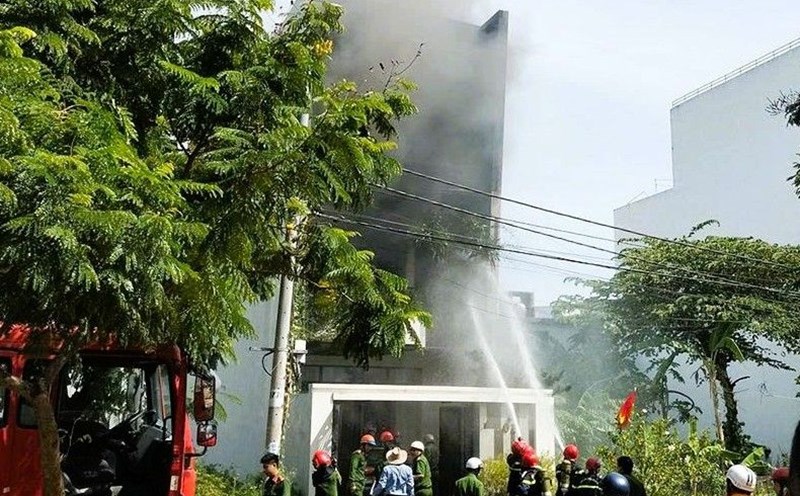Schools and extra-curricular centers only collect cash
On the morning of August 1, at a public primary school in Tay Ho ward, Hanoi, many parents took their children to grade 1. On the first day of taking classes, because they had not yet had time to buy books and uniforms before, many people took advantage of going to school to buy uniforms for their children and paid directly, but were surprised when they were refused a transaction by bank transfer.
"I went into the bookstore, the uniform was told by the staff there that I would not accept the transfer. The door of the room was also covered with a notice like that. I don't have cash because everyone now uses QR or money transfers, and in the end, I have to let my child go to class without a uniform," a parent shared.
Another parent whose eldest child is studying at this school, who continues to send his second child to grade 1 this year, said: "Last year the school still received money as usual when I bought books and uniforms for my eldest child. This year I refused, I found it quite strange.
It is noted that the refusal to pay through bank accounts not only occurs in schools, but similar situations also appear in some extracurricular centers. Ms. L.T.T, a parent whose child is studying at an extra-curricular center in Hanoi, said: Before, every center reported tuition fees and I transferred the money immediately, now they require direct cash payment. I have to give my child the money to pay, I am also worried about him being young, what if I lose it or spend it on something else".
Sudden changes in payment methods at educational institutions and extra-curricular centers have confused many parents, and at the same time questioned the transparency of revenue and expenditure activities.
Unusual signs to watch
According to Mr. Nguyen Van Duoc - General Director of Trong Tin Tax Consulting Services Company Limited, Standing Member of the Vietnam Tax Consulting Association - the choice of payment method does not change tax obligations if the business unit fully implements invoices, declares and pays taxes according to regulations.
However, if you refuse to pay without cash, there may be calculations to defraud tax or hide revenue. This is a sign that needs to be noted by tax authorities and interdisciplinary forces and soon put into the scope of inspection and examination. If violations are discovered, they must be strictly handled to set an example, Mr. Duoc emphasized.
From a management perspective, experts also believe that returning to the form of cash collection in the educational and learning service environment - where parents believe in transparency - can create a bad precedent, going against the trend of digital transformation and the policy of limiting cash transactions in the economy.
Previously, in early June 2025, right after Decree 70/2025/ND-CP of the Government and Circular 32/2025/TT-BTC took effect, there was a situation where some business households and retail stores refused to receive transfers, only accepting cash payments. In some cases where customers reacted, they continued to receive transfers but increased the selling price.
In Official Dispatch No. 124/CD-TTg dated July 30, 2025, the Prime Minister requested ministries, branches and localities to urgently promote cashless payments. In particular, the Ministry of Finance is assigned to preside over and coordinate with relevant agencies to strengthen inspection, examination and supervision of state budget payment activities, tax collection and payment, as well as compliance with legal regulations on invoices and documents in the purchase and sale of goods and services according to the Law on Value Added Tax and Decree 181/2025/ND-CP.
The dispatch clearly stated: it is necessary to promptly handle violations, especially those organizations and individuals who deliberately use cash to evade taxes and violate legal regulations.











